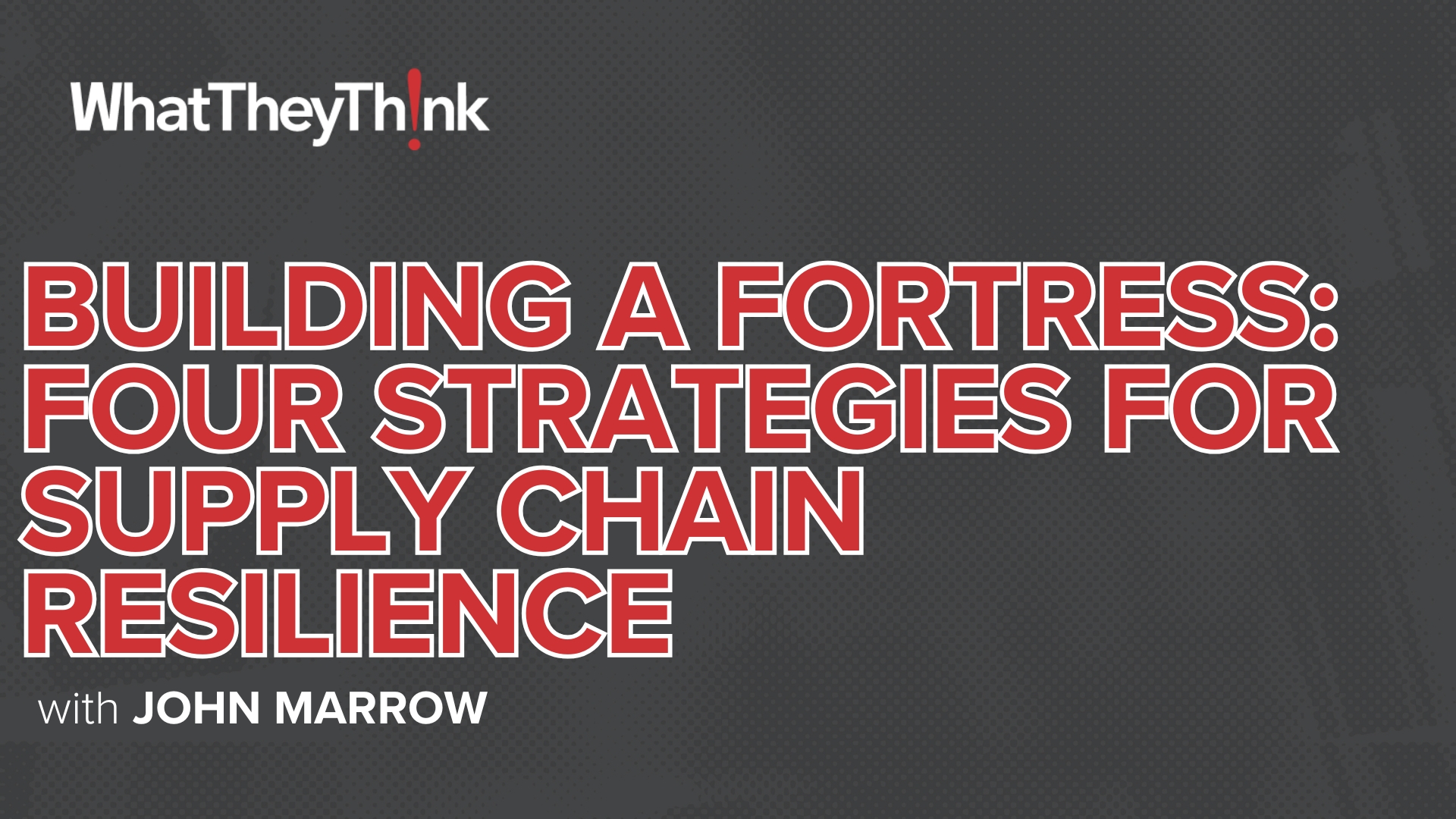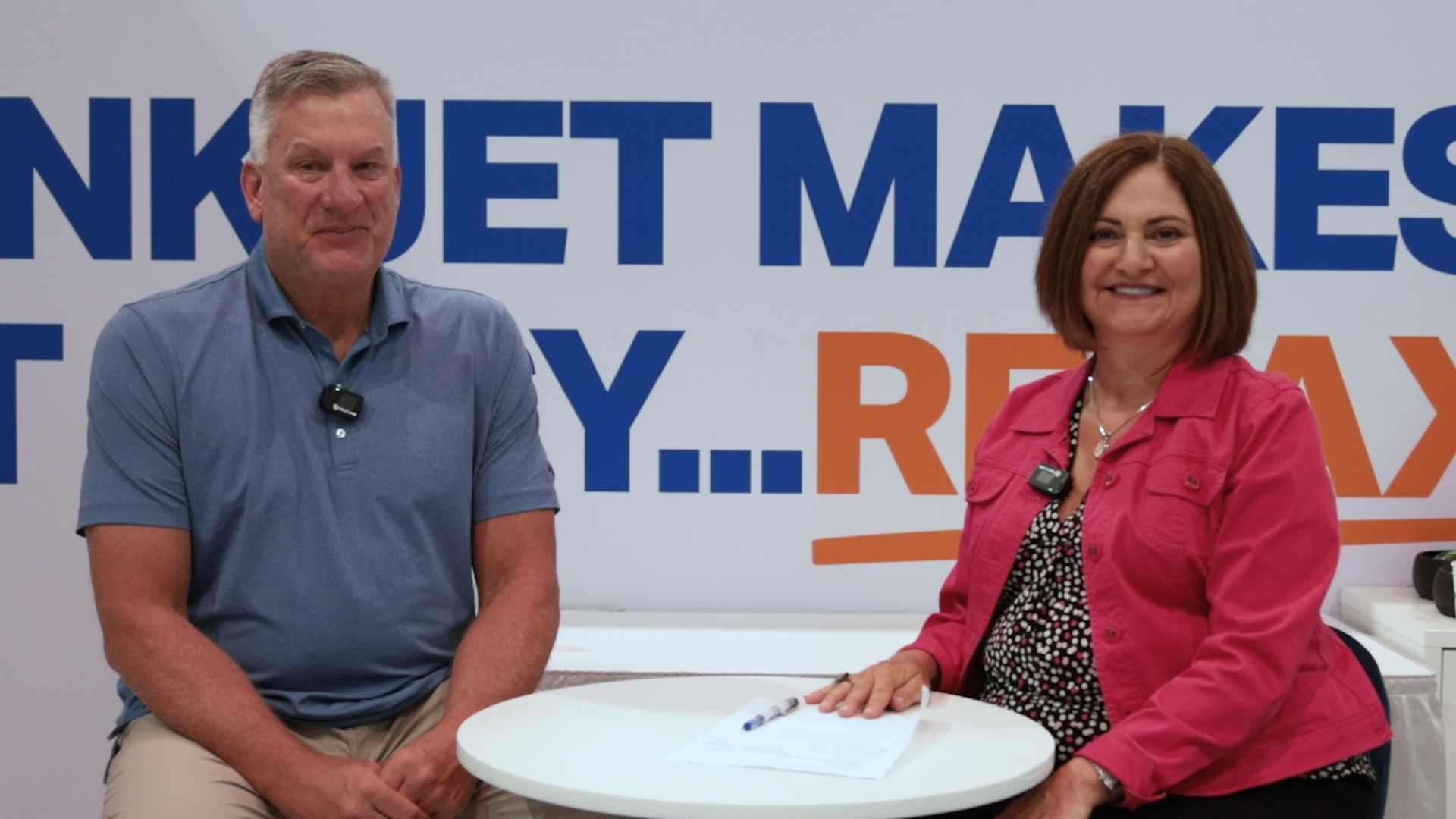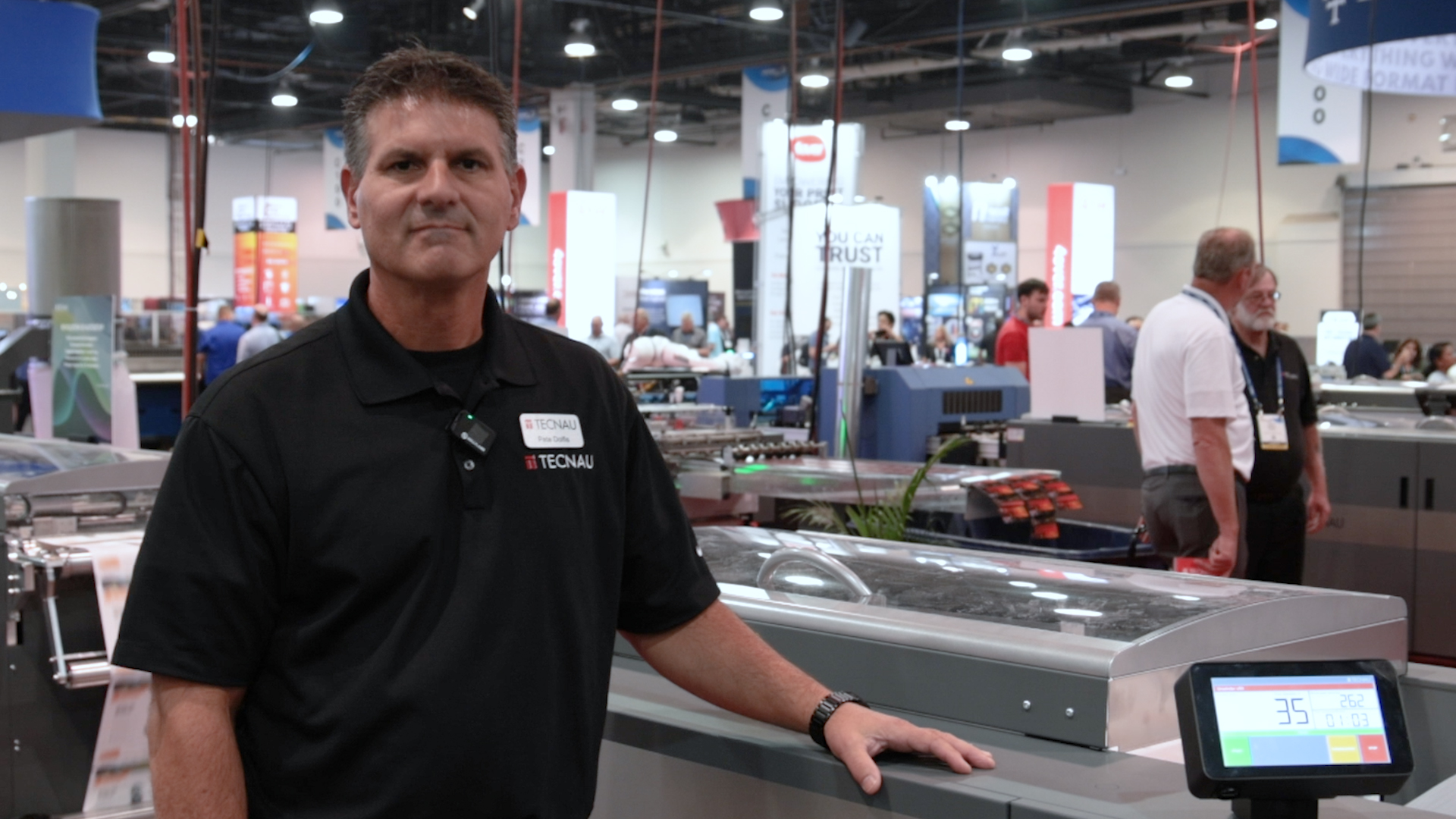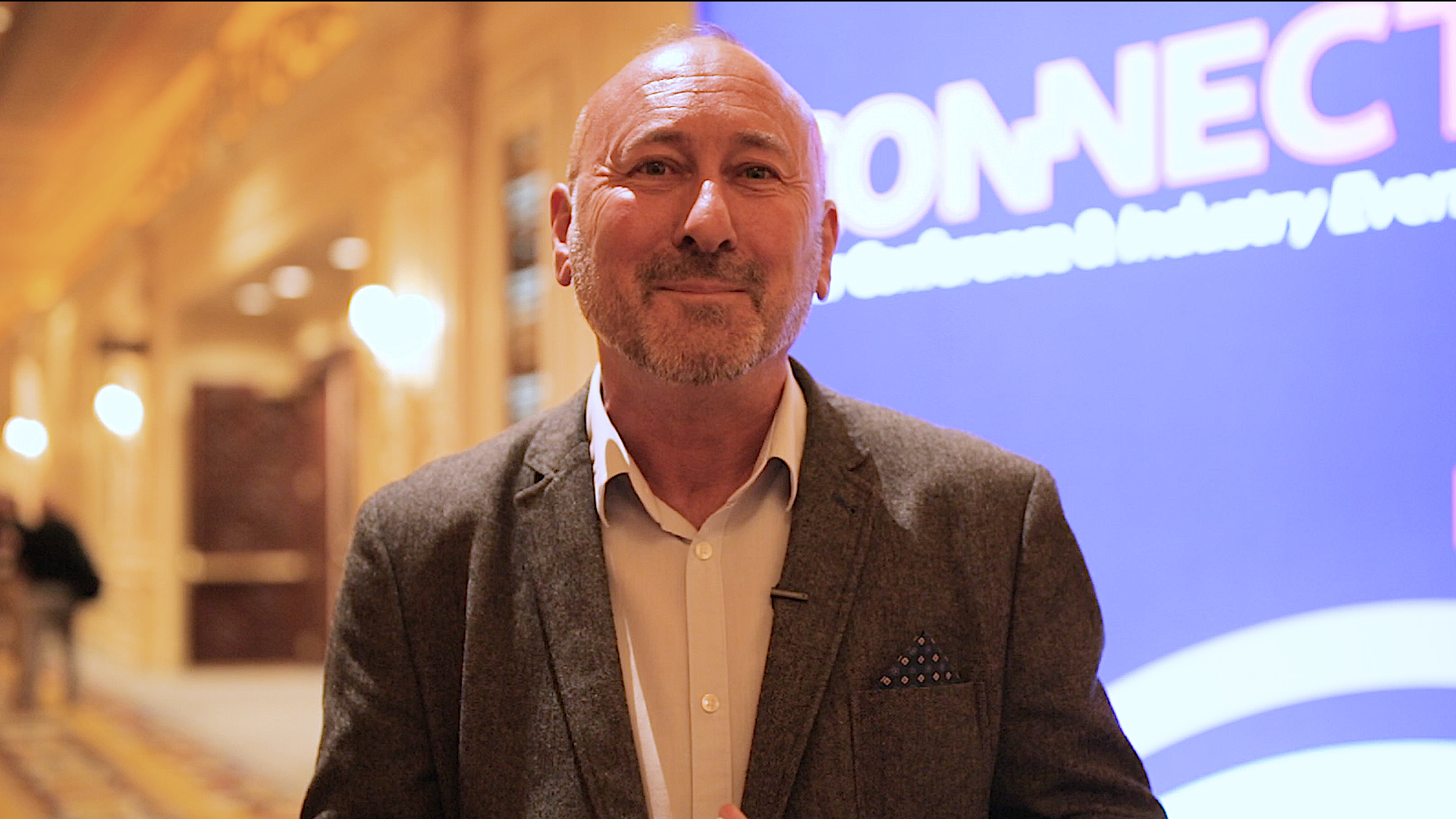Commentary & Analysis
Displaying 1601-1700 of thousands of articles
Insight You Need. Analysis You Trust.
Get the trusted insights you need to understand our evolving industry and emerging trends. Become a Premium Member.
October Shipments: Still On the Rise
October 2021 printing shipments came in at $7.23 billion, up from September’s $6.99 billion. This is the third month in a row in which shipments increased. Year to date, January-to-October shipments are $68.21 billion, a bit off 2020’s January-to-October number of $69.03. Unless November and December are higher than expected, 2021 will come in slightly below 2020.
Frank’s Time Bandits: 80 Years of Printing’s Past, Present, and Future
As the calendar brings us to the start of another year, Frank Romano reflects on the past in terms of printing achievements...as well as how science fiction predicted the future.
Around the Web: Locked Letters. Coffee Creativity. Clever Clip. Terrific Toaster. Neat Knife. Graphic Glasses. Lego Largesse? Ornithological Oddballs. Strategic Syrup. Gingerbread Ginmill.
Mary, Queen of Scots: champion paper folder. “Coffee spill art.” Redesigning the binder clip. The smartest toaster was invented in 1949. An Internet-enabled cutting system for printers. A monocle/eyewear system for display graphics. Is it really better to invest in Lego’s than gold? The future of the swag bag? Birds aren’t real! Taping Canada’s strategic maple syrup reserves. The future of work from home? Miller High Life’s gingerbread dive bar. All that and more in WhatTheyThink’s weekly miscellany.
Simple Steps for Factoring SEO into Your Marketing Strategy
Search engine optimization—more commonly known as SEO—is a great way to spread the word about your business and its offerings. This article provides an excerpt of a conversation Keypoint Intelligence Consulting Editor Christine Dunne had with SEO Specialist Jeanne Visser, who shares some simple steps that print companies can take to improve the SEO of their websites and blogs.
The Best in British Hospitality Design
Want to find out what constitutes the Best in British Hospitality Product Design? Textiles expert and WhatTheyThink contributor Debbie McKeegan is anxious to share! She interviews the team at this year's award winner, The Monkey Puzzle Tree. Cool name. Even cooler designs!
A Folding Carton Converter Brewing Beer?
Printing and packaging companies are always looking for unique ways to expand and grow their businesses. While printers may have historically had a reputation for “tipping a few beers,” not every printer can be a brewer. However, this one is!
Textiles Year in Review: There Were Challenges and Successes
Cary Sherburne looks back at some of the notable new products and trends that the textile and apparel industry saw in 2021—from a growing emphasis on digital printing, new inks (especially pigment-based), and the reshoring of apparel production.
Landa Digital Press Update: Crossover Points, Installed Base, and the Value of Being Anti-Fragile
Miss the “Landa Nanographic Printing in the Market” webinar on November 3? Here is a recap of Landa’s portion of the presentation, giving an update on its expansion, its installed base of users, and what it’s learned about the crossover points with offset.
Measuring What Matters to Drive Optimal Behavior
The default approach to working is to just show up and respond to inputs. But what’s the non-default approach to work? Goal setting, which is more important than ever because we’re all drowning in our inputs. Prioritization is critical and goals help us prioritize.
Your Business: Looking Back and Looking Forward
As we come to the end of the year, Pat McGrew encourages us to reflect on the choices made over the past year and set goals for the coming year. Think about how to evaluate what we have experienced and make a practical plan for 2022.
Waste Circularity in Labels and Packaging: Fixing a Broken Recycling System
Recycling is broken, and we need processes that can handle waste instead of shifting responsibility for handling waste back onto consumers and producers, which will not solve the problem.
Graphic Communications Leadership Institute (GCLI) Completes First Full Year to Rave Reviews
As the Graphic Communications Leadership Institute (GCLI) wrapped up its first year of operation, we spoke with three participants to better understand the value they are getting from this three-year program. We also spoke with Francis McMahon of Canon Solutions America, who hosted this year’s final session.
The Year in Review: Finishing Is In It to Win It
It has been a wild year of highs and lows and unique pressures, but the print finishing category met the challenge and pushed forward with lots of new offerings and opportunities. Trish Witkowski looks at some of the highlights.
Grossman Marketing: A Case Study in Successful Business Transformation
How many companies have been able to successfully transform their businesses multiple times over a century of continuous operation? Not that many. That’s why the Grossman Marketing Group’s story is so interesting!
Products in Motion: European Print Imports and Exports
Differing labor rates, scales of operations, and specialization contribute to a busy trade in print products among European countries. This article, by European section editor Ralf Schlözer, provides an overview of the types of print products crossing borders, as well as trends that have developed over the last five years.
Other Converted Paper Product Manufacturing Employment—2010–2019
According to County Business Patterns, in 2010, there were 35,368 employees in NAICS 32229 (Other Converted Paper Product Manufacturing establishments). This NAICS category bounced up and down over the course of the 2010s, ending with 34,770 employees in 2019. In macro news: Beige Alert!
Around the Web: Polly’s Paper. Printable Pianos. Toilet Tour. Milk Monitors. Rapid Rejection. Arm Artifice. Perilous Press. Bogus Bomber. Pachyderm Parade. Nutty Nutcracker. Crazy Condiment.
Meet Polly Verity: paper sculptor. Printing playable, paper-based pianos. An exhibition of artistic toilet paper holders. New technology can detect and warn of bacterial contamination from inside a milk container. Introducing the Journal of Universal Rejection. Graphene-based batteries headed for the EV market. Attempting to use an artificial arm to fake vaccination. William Bullock, the ill-fated inventor of the web rotary press. The FBI suspected the inventor of the Tickle Me Elmo doll of being the Unabomber. How to prove the safety of the Brooklyn Bridge? A terrifying nutcracker powered by an explosive piston. “Terry’s Chocolate Orange Mayonnaise,” for some reason. All that and more in WhatTheyThink’s weekly miscellany.
Why Can’t I Get My Paper? It’s All About the Supply Chain
Buying paper has become a convoluted process, putting stress on inventory management, procurement, and vendor-client relationships—the result of forces that had begun before the pandemic. High Rock Strategies’ Lois Ritarossi looks at some of the reasons for the paper crunch.
Driving a New Workforce: How the Hybrid Working Trend is Affecting Print
These pandemic times continue to affect how we work as well as how we print. Many of today’s employees are more evenly splitting their time between their homes and offices, which is causing a shift in how businesses print and from where. These trends have the potential to cause across-the-board changes for vendors, OEMs, and content creators alike.
The Time is Now for Fashion to Get Wholly On Board with Sustainability!
As we move towards a sustainable future, each and every product we consume has an environmental impact. Every choice that we make as designers and printers matters and collectively, we can make a significant contribution to the environmental impact of the products we create across all commercial sectors. Together we can drive effective change for a sustainable future. That’s the message that global retail sustainability strategist Steve Lister is communicating through his participation in HP’s Sustainable Impact Series. Don't miss this important read! Or view the recorded presentation.
What’s Second-Best to In-Person Conversations? Augmented Reality—and the Data Show It
You’ve seen the data for the effectiveness of augmented reality (AR) for sales and marketing. This isn’t due to novelty. There is real psychology to why it works.
Teamwork in a Challenging Labor Market
Teamwork can be a differentiator for recruiting and hiring in a tough labor market. Technology can help set up the conditions (trust and transparency) that make teamwork possible.
The Target Report: Slugfest Breaks Out Over RR Donnelley—November 2021 M&A Activity
Chatham Asset Management Victorious in Fight Over RRD, CJK Acquires; and more…
Johnson’s World—Warming Up To Color: “Unsettled” Is a Great Book, but the Graphs Miss the Color Mark
Steven Johnson takes a look at Dr. Steven E. Koonin’s new book on climate change “Unsettled”—an excellent book that is marred by bad chart printing.
European Print Industry Snapshot: Romania
In this bimonthly series, WhatTheyThink is presenting the state of the printing industry in different European countries based on the latest monthly production numbers. This week, we take an updated look at the printing industry in Romania.
Time to Talk Turkey about Sales—Part 2: Remembering to Invoice
Of course, you are invoicing, but are you invoicing the correct amount? Your customer will let you know if you overcharge, but they aren’t as likely to come to you with undercharges. Pat McGrew explains why now is an excellent time to look at your invoices for the last quarter to see if you have a chronic problem.
Can the Fashion Industry Change Quickly Enough to Positively Impact Climate Change? Or Perhaps the Better Questions Is, Will They?
The fashion and textiles industry is one of the world’s worst offenders when it comes to impact on climate. There’s lots of talk from brands about how they will reduce this impact, but it’s not as straightforward as it may seem. To truly drive change, there are many friction points across the entire supply chain that need to be aggressively addressed. We discuss a few of them in this article.
The Power of Print: Shifting from Commodity to Communications
Mass digitalization and adoption of an online shopping mindset have resulted in fewer communications channels between brand and buyer. It’s no wonder that today’s buyers prefer print over digital. Contributor Joanne Gore looks at three trends that illustrate a shift from the traditional “print is a commodity” mindset to print as a high-value communications channel.
You Can Work from Anywhere, But Can Your Technology Keep Up?
New technology solutions have opened the doors that allow work to get done from anywhere and on virtually any device, providing the resources needed to keep businesses moving ahead. Terry Antinora, VP and General Manager, Workplace Solutions Offerings at Xerox, discusses technologies that support a decentralized workforce, placing productivity at the forefront.
October Graphic Arts Employment—Print Production Up, Non-Production Also Up
In October 2021, all printing employment was up +1.0% from September, with production employment up +0.9%, and non-production printing employment up +1.2%.
Around the Web: Handy Hemp. Digital Donuts. Tarmac Trouble. Cool Calendars. Punctuation Peril. Sheet Chaise. Printed Peeper. Droid Dante. Robot Reproduction. Barbecue Busking.
Hempitecture manufactures hemp-based insulation and other construction materials. NFTs jump the latest of many sharks. Graphene helps fill in potholes. A brief history of the Advent calendar. Is the apostrophe on the way out? A chair made of interleaved sheets of paper and held together by friction. The first-ever recipient of a 3D-printed prosthetic eyeball. Robot artist Ai-Da tries her hand at poetry. A rolling piano barbecue that grills food while the keys are struck. The “social distancing zapper.” All that and more in WhatTheyThink’s weekly miscellany.
Production Inkjet: The Year in Review
In 2021, for commercial print applications, production inkjet volumes held their own, and some applications saw modest growth. While production inkjet can displace toner printed pages, and has been for well over a decade, the lion’s share of the growth opportunity is offset pages, and that will continue for the foreseeable future. David Zwang looks back at recent press introductions, many of which are targeted at that volume.
Eurojersey Leverages Digital Print for Knitted Collections
When we talk about digital print for fabrics, we are often dealing with woven fabrics. But digital print can be used with knitted fabrics as well, as demonstrated by the success of Eurojersey in introducing digitally printed knit collections. The company, based in Italy, has been around for nearly 70 years and continues to lead the market in technical fabric innovation and sustainable sourcing. With its digitally printed Sensitive® Fabrics, the company uses digital printing to give the fabric a different appearance and different properties compared to its plain color products. Learn more.
HP xRServices: A Print-Centric Mixed Reality Solution
HP has unveiled is XRServices solution, which it calls the “first print-industry mixed reality service.” This announcement represents HP’s continued investment in extended reality (XR), as the firm has already introduced a virtual reality (VR) hardware line with its Reverb series of headsets.
Latest Updates: Printing Industry Affiliates
The printing industry affiliates, under their Operating Committee structure, work together in a number of ways to support members of more than 5,000 printing companies and the printing industry as a whole. WhatTheyThink Senior Editor Cary Sherburne recently spoke to the Operating Committee leadership team for an update.
Millennials Are So Yesterday…Hello, Gen Z!
If you haven’t noticed, the emphasis on marketing to Millennials is shifting. Today, it’s all about Gen Z. One of the fundamental characteristics of Gen Z, however, is that they distrust the brands trying to market to them. What does that mean for marketers?
Trying to Learn Complex Print Software by Calling Support
You can’t learn a Print MIS system by calling the support desk. One ticket at a time is not an ideal learning environment. Internal expertise and the ability to optimize your print software investments delivers value directly to your bottom line.
Digital Packaging Print Set to Grow at 11.2% Y-O-Y as It Capitalizes on Post-Pandemic Trends, Smithers Says
Packaging is becoming increasingly important to the print industry after COVID and the specific conditions of the pandemic have further accelerated the use of digital (inkjet and toner) equipment in this space. Smithers editor John Nelson offers some highlights from the new Smithers report, The Future of Digital Print for Packaging to 2026.
J.P Bobst Knows History and Is Setting the Future Stage for Packaging
A company the size and breadth of the Bobst Group plays a big role in setting the direction of the packaging industry in the future. Their core values of People, Technology, and Financial, with a strong desire to create a more sustainable future, bode well for the many changes ahead.
Koenig & Bauer Strengthens Its Position in Packaging
With the launch of the VariJET 106 and the opening of the Packaging Print Customer Center in Germany this year, it is time to review the offerings Koenig & Bauer has for the packaging market—and they are remarkably comprehensive. The article by European Section Editor Ralf Schlözer reviews the new line-up and provides some details on the recent launches.
Plan for Profitability with PlanProphet
This Product Spotlight looks at PlanProphet, a specialized, complementary solution to your print MIS that acts as your business virtual assistant. Powered by the industry-leading Salesforce CRM, PlanProphet is a cloud-based subscription software that analyzes customer data and behaviors to identify trends and automate touchpoints.
Leather Goes Vegan: Is This the Next Normal for Auto Interiors?
As the world continues to struggle with the climate change crisis, methane emissions have been tagged as a key contributor that needs to be mitigated. And cows are being targeted as a key contributor to these greenhouse gas emission levels. Do we eliminate cows completely? Or are there other solutions? This article dives into those issues.
Compu-Mail: Relevant Information to the Right Person at the Right Time
Compu-Mail is a direct marketing services and solutions company located in Grand Island, N.Y., that provides database marketing for pharmaceutical companies, statements for medical insurance and even membership cards for automobile clubs. They have built their business around the variable data printing model: “Relevant information to the right person at the right time.”
Stationery Product Manufacturing Employment—2010–2019
According to County Business Patterns, in 2010, there were 24,349 employees in NAICS 32223 (Stationery Product Manufacturing establishments). This NAICS category declined slowly over the rest of the decade, ending with 15,678 employees in 2019. Also: following up a BoSacks tweet about newspaper circulation.
Around the Web: Lovin' 'Letters. Follicle Fabrication. Canine Calling. MySpace Memories. Freaky Furby. Bar Bots. Better Batteries. Unspun Unveiled. Plague Planet. Plushie de Pain.
Newsletters continue to thrive. Making ink from human hair. The “DogPhone,” for some reason. “MySpace nostalgia,” also for some reason. Integrating a Furby into a modular synthesizer. Robot bartenders streamline drink-making. A graphene-based battery charger accelerates charging speed. 3-D weaving can produce one-off pants in 10 minutes. The Human Library aims to promote more empathetic human relations. This week’s animal plagues had a 2020 feel to them. A bread plushie.” All that and more in WhatTheyThink’s plague-ridden weekly miscellany.
Driving the Reinvention of Printed Textile Production Demands an Acute Knowledge of Process
Over the years, digital textile printing appears to have become much simpler; and that is a tribute to the research and development teams, who have now perfected textile printing on an industrial scale by fine tuning physical manufacturing technology alongside digital innovation. But each unique combination of design, substrate, ink type, print process and post finishing has a cumulative impact on final printed output. This article, compliments of textile expert and WhatTheyThink contributor Debbie McKeegan, explains.
Communication Channels: The Focus Should be on the Strategy!
Today’s marketers must ensure that their communications are having an impact, which can be challenging when consumers’ communication preferences are individual and ever-changing. Some marketers obsess about the method of communication when developing their campaigns, but the overall strategic vision of the campaign should ultimately drive the channels that are used to deliver that messaging.
Wide Format and Signage: Demand- and Technology-Side Drivers for 2022
As we head into 2022, we look back at some demographic trends that could prove favorable for wide-format and signage providers, as well as offer some technology trends to keep an eye out for.
Living Walls: Great Ideas for Transforming Spaces
Over the past three to four years, there’s been a surge in the use of living walls, also known as plant walls or green walls. These modern applications cultivate a feeling of well-being in any space. While popular, most versions of these walls need care and maintenance, requiring real soils, air, light and water. FASTSIGNS walks us through some of the types of these walls seen today.
Time to Talk Turkey About Sales—Part 1: Firing Customers and Avoiding Discounts
We use the phrase “let’s talk turkey” when Thanksgiving is just over a week away…or we want the other party to know that it’s time to get to the bottom line. As you look forward to 2022, Pat McGrew talks turkey about why this is a good time to think about the bottom line for your sales teams and how they interact with customers.
What You See Is What You Get. Or Not.
We’ve all been told not to rely on the color we see on our monitors because it’s not accurate. Most of the time that’s true, because most people don’t have capable devices or those devices configured properly. Dan Gillespie, Director of Technical Services at Alder Color Solutions, compares two monitors and explains how the accuracy of a display is a function of color gamut.
Strategic Focus: Omer Kulka Explains Kornit’s Shift of Focus and View of the Industry
Kornit Digital showed a 118% year-over-year revenue increase for the second quarter of 2021. The company also has shifted its strategy a bit and made a couple of acquisitions that reflect this shift. In this Executive Q&A, Chief Marketing Officer Omer Kulka shares insight about Kornit’s strategic focus and the state of the industry at large.
Moving Pictures: Automotive Wrap Applications Can Involve More than Cars
A photo gallery of recent vehicle wrap projects for private, commercial, and even aquatic vehicles.
First Class Mail? An Uncertain Outlook for Direct Mail in Europe
The COVID-19 pandemic dealt a blow to the direct mail market in Europe. However, there was already some pressure on parts of the market in the years before. European section editor Ralf Schlözer provides some details on market development and revenues achieved for direct mail in Europe.
September Shipments: We Got Good News and We Got Bad News
September 2021 printing shipments came in at $6.93 billion, up from August’s $6.87 billion. It’s not a massive increase, but we’ll take it. Year to date, January-to-September shipments are $60.48 billion, a bit off 2020’s January-to-September number of $60.97. Can we close the gap in Q4?
Around the Web: Better Breathing. Climate Catastrophe. Mrs. Mural. Tome Time. Phone Future. Zillow Zaniness. Tube Trouble. Bear Blending. Dead Doornails. Claus Crisis.
Robotic textiles that can help you breathe better. Fast fashion’s major manufacturing hubs may soon be under water. A robot painter sows the seeds of marital discord. A clock that displays the time using quotes from books. What will the smartphone of the future look like? The world’s first active heating fabric—thanks to graphene! An Indiana town is luring workers by offering free grandparents. Zillow shuts down doomed AI-based real estate valuation business. A “handheld toothpaste manipulation device” that will put toothpaste back in the tube, for some reason. Photoshopping Paddington Bear into every movie. The origin of the phrase “dead as a doornail.” The labor shortage is now getting real: there is a shortage of Santa Clauses. All that and more in WhatTheyThink’s weekly miscellany.
Not Fast Fashion—Extraordinary Fashion: Kornit Fashion Week Rocks Los Angeles to Deliver a New Future for Apparel Production
We talk a great deal about on-demand manufacturing in textiles and apparel, but it takes more than talk. Los Angeles Fashion Week may have been a tipping point between talk and action, according to on-demand apparel manufacturer Kirby Best. Why? Take a look at this article compliments of WhatTheyThink contributor and textiles expert Debbie McKeegan that demonstrates what can be done with digital technologies to change the way we think about—and produce—fashion.
What is the Metaverse, and Why Should Businesses Care?
The term “metaverse” is being thrown around a lot lately, but what does it really mean? When we hear tech evangelists discussing the metaverse today, what they’re really talking about is user-driven interactions within virtual realities. This article explores early examples of the metaverse and highlights why businesses should be paying attention.
Product Spotlight: Canon PRISMAprepare Go
Jennifer Matt takes an in-depth look at Canon’s PRISMAprepare Go pre-production workflow solution that can be deployed and optimized in a small print facility whose primary business is processing small “upload and print” orders.
What’s New with USPS Informed Delivery?
A look at the most recent USPS Informed Delivery update, including updated user stats, the latest open and click-through rates, and new features.
Don’t Get Spooked by Salespeople!
There are two sides to every sale: the buyer and the seller. Each party usually has the support of teams that help to solidify the requirements of the sale. hardware and software acquisitions are the result of long relationships with specific salespeople or the companies they represent—but that closeness can bring bias to the sales cycle. Pat McGrew explains how not to get spooked by the friendship.
Land The Big One: Three “Big Contract” Practices that Always Work
All salespeople want bigger contracts. Big contracts are the rising tide that floats all boats. But big deals can be complex, messy, and sometimes involve moving backwards to go forwards. Contributor Lisa Magnuson identifies three practices that always work.
The Target Report: The End of the Dotcom Era—October 2021 M&A Activity
HH Global Acquires Noosh, Allan Creel Jumps Back In, PE Still Loves Labels, and more…
Leading Textile Operations Provide a Template for Increasing Sustainability in the Industry
We always talk about the fact that the textiles industry is the world’s second largest polluter. Raising this awareness is helpful, but only if companies take the initiative to change the way they operate to reduce pollution, water and energy use, shipping, and transport, all while treating workers well and providing a living wage. In this article, we document some of those initiatives that can act as a template for others to follow.
Train Your Customers: An Educated Customer Is Your Best Customer
As the pandemic changes the print-buying environment, it becomes more important for customers to understand the new technology and business practices that make buying printing easier. Contributor John Giles explains how to train your customers and establish realistic expectations.
Printing On Glass: The View of the Future Is Bright with Inkjet Technologies
Over the years, many different methods have been used to decorate glass including painting, silk screen, sandblasting, etching, and decals and cling films—and of late inkjet technology has been increasingly used. David Zwang surveys the current state of direct-to-glass printing.
Around the Web: Robot Record. Living Lava. Digital Doors. Kooky Kafka. Goofy Glasses. Vaccine Vocab. Meta Misinterpretation. Clever Cards. Arrested Android. Truck Tech. Sustainable Spirit.
A writer, musician, and AI collaborate on a new album. Seen on Halloween: a human lava lamp. Replacing clear glass cooler doors with dynamic displays, for some reason. A recently unearthed collection of drawings shows a playful side of Franz Kafka. Good grief: are full-face sunglasses becoming a thing? The OED chooses its Word of the Year. Memo to Facebook: “Meta” is similar to the Hebrew word for “death.” MasterCard adds distinctive notches to its credit, debit, and gift cards for the visually impaired. Graphene integrated into trail running shoes. Ai-Da, an “artist robot” detailed in Egypt on suspicion of espionage. Air Vodka: “the world’s most sustainable spirit.” All that and more in WhatTheyThink’s weekly miscellany.
Paper Bag and Coated and Treated Paper Manufacturing Employment—2010–2019
According to County Business Patterns, in 2010, there were 50,879 employees in NAICS 32222 (Paper Bag and Coated and Treated Paper Manufacturing establishments). This NAICS category peaked two years later at 54,175, declined slowly over the rest of the decade before shooting back up to 51,811 employees in 2019. In macro news, Q3 GDP growth is up 2.0%.
Are You Noticing More Holiday Catalogs This Year? You’re Not Alone!
I’ve noticed an uptick in the number of holiday catalogs I receive in the mail, but I wasn’t sure if it was just me. This article explores the changing role of printed catalogs and considers what the future might hold in today’s highly digital world.
3D Printing Shifts into Fourth Gear: It’s Time to Increase 3D Printing in Automobile Manufacturing
3D printing is accelerating in the auto industry, shifting from prototyping and tooling to finished parts. Manufacturers of consumer, commercial and military vehicles are producing original and replacement parts with plastic and metal. Contributor Pete Basiliere looks at growth trends in automotive 3D printing.
Three Ways to Prepare Cotton and Viscose Fabrics for Brighter, Sharper and More Cost Effective Inkjet Printing
Proper fabric preparation can maximize the intensity and brilliance of the printed colors and control how the ink spreads on the fabric, optimizing printing definition and delivering a better-looking end product to delight brands and consumers. As brands and designers increasingly look for ways to use cellulosic fibers such as cotton and viscose, Huntsman Textile Effects offers good advice in this article provided compliments of Texintel.
Root Cause Challenges in Print Software
Sometimes the way you’ve been managing your core business data in your Print MIS/ERP is fundamentally broken. This has a ripple effect across your business, so it’s worth the effort to clean it up. Stop ignoring the crack in your business foundation.
Are Workload Challenges Affecting Your Employees?
Workplace satisfaction matters. Unhappy employees equal higher turnover. Higher turnover equals higher HR costs and, especially in the printing industry, real concern about the ability to fill open positions. A workplace satisfaction survey from Parallax, while focused on the digital services industry, shines a spotlight on issues that many other employers should consider, including those in the printing industry.
Vehicle Visions: The Role of Textiles in Today’s Automobiles
You might be surprised at the volume and type of textiles being used in today’s vehicles—including woven, knitted, and nonwovens. Cary Sherburne takes nonwoven fabrics for a test drive, and identifies business opportunities—perhaps not so much in mass manufacturing of automobiles, but in customization of vehicles, which is growing in popularity.
drupa Essentials of Print: What’s Holding Back Digitally Printed Packaging?
It may sound unnecessarily provocative to suggest that digital print in packaging has failed to fulfil expectations, but some of the more idealistic predictions of digital conquest have not yet come to pass. What are the reasons for this? And is the post-COVID world closer to the tipping point? Tim Sykes, Brand Director at Packaging Europe, explores the barriers that may be holding back the digital tide.
A Bright Outlook for Book Printing and Publishing
At the Frankfurt Book Fair 2021, Intergraf, the European trade association for printing, held a conference on book printing and publishing. Book printing is one of the bright spots among established print applications with increasing sales of printed books. Still, there are a couple of changes in store and several speakers shared their insights. European section editor Ralf Schlözer reports on the outlook for book printing and publishing.
Labels and Packaging: Luxe Pack Sets the Tone
Label and packaging procurement reached new heights during the pandemic, and as a result, while there may not have been many live events this year to showcase the latest trends in label and packaging, hardware manufacturers and software developers have been busy—and the industry has been humming along.
Lessons from The Jetsons...and How to Become a Digital Boss
Learning and using modern technology is particularly important in design and publishing today as most industries are struggling to hire people due to a national labor shortage. There is the need to train new workers not just in how to use their devices and applications, but how to streamline their computer usage to get the most efficient work possible. Guest contributor Laura Moynihan, Director of Digital Helpmates, sheds light on the issues of learning and using modern technology.
Koenig & Bauer: Powering Through the Pandemic with a Wide Range of New Products
Koenig & Bauer just reported one of their best years ever, despite the difficulties of the pandemic, and is looking forward to good momentum going into next year. In this interview, Cary Sherburne talks with Kilian Renschler, the new President & CEO for the Americas, as well as Senior Vice President of Marketing Eric Frank, to get the latest details.
Print Industry Looks to a Lower Carbon Future
While there remains much uncertainty in the print industry after two years of unprecedented disruption, one of the strongest emergent trends post-pandemic has been the interest in more sustainable print processes. Smithers editor John Nelson summarizes these issues in this article featuring highlights from the latest Smithers study “The Future of Green Printing Markets to 2026.”
Tripping the Light Fontastic: We Just Hit the One-Millionth Digital Font
In this article and accompanying video, Frank celebrates the release of the one-millionth digital font, looks back at the evolution of typeface design and distribution, and provides a comprehensive list of sources of digital fonts.
Around the Web: Blue Blues. Token Tracking. Prince Printing. Diminished Denim. Fridge Flaming. Golden Graphene. Mountain Messaging. Munster Music. Silly Strings. Festive Franks.
The latest supply chain victim: blue paint. Adobe Photoshop to add “Prepare as NFT” option. 3D printing system maker Stratasys partners with Prince’s Paisley Park. Making denim production more sustainable. Amazon is now a bigger shipper than FedEx. You can now get nasty emails from your refrigerator. Graphene + gold = smart windows. Interesting facts about “It’s the Great Pumpkin, Charlie Brown.” A lost hiker ignores calls from rescuers. A long lost musical album from The Munsters. Hot dog-flavored candy canes. All that and more in WhatTheyThink’s weekly miscellany.
September Graphic Arts Employment—Print Production Up, Non-Production Down
In September 2021, all printing employment was up +0.8% from August, production employment up +1.1%, and non-production printing employment up +0.3%.
Photo Printing Market after COVID-19: Data and Trends
The global pandemic has turned the entire economic order upside down without sparing the photo printing industry. All previous forecasts turned out to be simply inadequate to the new challenges. This article, written and sponsored by Printbox, discusses how the sales of photo products changed from 2019 to 2020, how the lockdown influenced the behavior and preferences of consumers, and the post-pandemic trends that will affect sales in 2022.
Designer Q&A: Meet Irene Van Ophoven and Her Stunning Interior Products that Push the Established Boundaries of Design
In this piece, textiles expert and WhatTheyThink contributor Debbie McKeegan interviews Dutch designer Irene Van Ophoven about her journey to establishing her own design studio, including how digital technologies have enhanced her ability to create innovative, stunning designs.
A Great Customer Experience: It’s All About Balance!
It is now more important than ever for providers of transactional communications to deliver the positive experience that their customers have come to expect. Keypoint Intelligence’s newly released transactional communications survey data confirms that a positive customer experience can be a compelling competitive differentiator in today’s market.
Print Production Outlook: Takeaways from the October 6 Webinar (Part 2)
Part 2 of a two-part series based on the What They Think webinar “Print Production Outlook: Tracking the Turning Points.” In Part 1, presenter German Sacristan of Keypoint Intelligence analyzed Keypoint and other data on the industry’s growth and key turning points, including the shift to high-speed inkjet. In Part 2, Sacristan analyzes the current and future state of industry applications, as well the state of packaging and labels.
Your Existing Technology Stack Matters
Your existing technology stack should be one of the most important factors in making decisions about new software solutions and new automation projects.
European Print Industry Snapshot: Greece
In this bimonthly series, WhatTheyThink is presenting the state of the printing industry in different European countries based on the latest monthly production numbers. This week, we take an updated look at the printing industry in Greece.
Driven to Distraction: Display Graphics and Signage in the Automotive Industry
When we think of display graphics in the automotive industry, the first thing that springs to mind is vehicle graphics. But display graphics are taking on new roles as a subset of experiential or environmental graphics for auto dealer showrooms. As the auto sales experience is changing post-COVID (as are so many things), and more auto sales move online to sites like Carvana, display graphics are also in a state of flux.
Johnson’s World—Bad Data Needs a Scrub: Clean up Your Data Before It Takes You to the Cleaners
Steven Johnson shows how customization and personalization based on bad data can lead to ill will, poor publicity, and even lawsuits.
Print and Automotive: Two Industries Driving Innovation in Customer Engagement
During the pandemic last year, auto sales dropped radically and innovative auto direct mail campaigns geared down. Fast-forward 16 months and the situation is very different, as more and more people head back out on the road. Joanne Gore looks at how printers, automobile brands/dealers, media agencies, and tech companies are teaming up to create engaging and innovative marketing campaigns for automobiles—and driving business.
SwagCycle: It’s All About Landfill Divergence for Textiles
Among the many sustainability issues the textiles and apparel industry is facing, textile waste in landfills is near the top of the list. In this article, we talk with Ben Grossman about SwagCycle, his attempt to give back with a goal of landfill divergence for textile-based products, contributing to a reduced footprint and increased circularity.
Other Paperboard Container Manufacturing Employment—2010–2019
According to County Business Patterns, in 2019, there were 18,741 employees in NAICS 322219 (Other Paperboard Container Manufacturing establishments), a drop from 21,954 employees a year earlier, and the lowest ebb for this NAICS category. In macro news, new business formation goes “bezonkers.”
Around the Web: Fruit First. Font Follies. Public Papers. Graphene Gums. Android Artist. Resignation Reality. Pulling Plastic. Citation Silliness. Toy Telephony. Venerable Venue. Spider Sleepwear.
Fun facts about the word “orange.” A 1909 patent for a font that can be read either from left to right or right to left. How typeface choice can impact learning and comprehension. Public radio may help save newspapers. Graphene’s uses in dental applications. Meet the Flingbot and its approach to abstract art. What’s behind The Great Resignation? An approach to removing ocean plastic that just might work. A traffic camera confuses a T-shirt with a license plate. Fisher Price’s classic Chatter Telephone can now make real calls, terrifyingly. A new book celebrates the Fillmore East. Get comfy in (or terrified by) giant tarantula pillows. All that and more in WhatTheyThink’s weekly miscellany.
When to Use Rotary Screen Printing and When to Choose Digital Textile Printing with SPGPrints
As more companies in the textile and apparel industry look to digital printing for more efficiency and a smaller environmental footprint, it can be confusing to determine exactly where digital textile printing fits. In this guest post from SPGPrints, compliments of Debbie McKeegan and Texintel, Jos Notermans highlights seven different factors that help with that decision process.
Tilia Labs: Reaching Maximum Velocity with Intelligent Printing
Small print jobs have been on the rise, even as many of the pre-production processes have remained unchanged. This article explores how intelligent planning software solutions like those from Tilia Labs can help PSPs better manage the influx of smaller jobs and optimize print production.
Improving Profits through Employee Engagement
You already measure important KPIs in your business. You look at your financials and monitor things like cash position, inventories, age of receivables, maintenance records, equipment productivity, daily production output, etc. When was the last time you measured employee engagement? Wayne Lynn explains how people are the core asset of your business, and why it may be time you started learning much more about them.
Print Production Outlook: Takeaways from the October 6 Webinar (Part 1)
Part 1 of a two-part series based on the WhatTheyThink webinar “Print Production Outlook: Tracking the Turning Points.” In Part 1, presenter German Sacristan of Keypoint Intelligence analyzes Keypoint and other industry data on the state of the industry’s growth and key turning points.
Assessing the Validity of a “Must-Have” Software Feature
“Must-have” features typically are not worthy of holding up a launch or delaying the utilization of software. The best way to assess the importance of features is to start using the software, then you stop assessing “theoretical” importance.
- Questions to ask about inkjet for corrugated packaging
- Can Chinese OEMs challenge Western manufacturers?
- The #1 Question When Selling Inkjet
- Integrator perspective on Konica Minolta printheads
- Surfing the Waves of Inkjet
- Kyocera Nixka talks inkjet integration trends
- B2B Customer Tours
- Keeping Inkjet Tickled Pink
© 2024 WhatTheyThink. All Rights Reserved.














